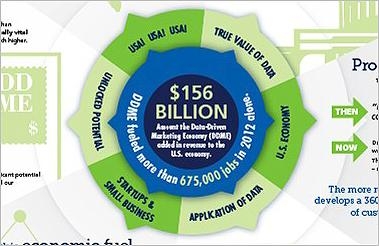
Restricting companies' ability to use data about consumers for marketing purposes could have a broad economic impact, according to the Direct Marketing Association.
On Monday, the trade group
said that a study it commissioned concluded that data about individual consumers accounted for more than $150 billion last year -- representing around half of all marketing communications spending.
The report, “The Value of Data: Consequences for Insight, Innovation & Efficiency in the U.S. Economy,” also concludes that such data is responsible for almost 700,000
jobs.
“In 2012, producers of goods and services spent about $156 billion and employed about 676,000 people, to buy marketing services that could not have been performed without
individual-level consumer data,” states the DMA's report, which was authored by Harvard Business School's John Deighton and Columbia University's Peter Johnson.
advertisement
advertisement
The report also states
that most of the value of data about consumers was generated by selling or sharing it with third parties. The authors write that only the “large and self-sufficient” companies kept data
about their own customers to themselves. By contrast, about $110 billion depends “directly or indirectly on individual-level data exchanged among firms.”
The authors add that the
so-called “data-driven marketing economy” will grow substantially in the future. “Not only will the online sector expand, but offline marketing practices will increasingly rely on
individual-level data,” the study says.
The report says that much of the value of the data comes from its ability to help companies acquire new customers. “Because finding new
customers is the business practice most closely tied to demand-generation, exchange of data bears directly on the ability of young U.S. businesses to grow,” the study states.
Deighton
previously contributed to a 2009 study commissioned by the Interactive Advertising Bureau, which concluded that the ad-supported
Internet is responsible for around $300 billion a year in employee wages.
The DMA's study comes as lawmakers and policymakers are scrutinizing data brokers. The Federal Trade Commission
recently demanded that nine data brokers respond to subpoenas seeking information about how they collect and use information about consumers.
The Senate Commerce Committee also is studying the
industry. Last month, Sen. Jay Rockefeller (D-W.Va.) asked 12 Web publishers
to provide information about how they share information with data brokers.
DMA vice president Rachel Thomas told reporters on Monday that it was "incredibly important that any legislation or
regulation, even if it's well-meaning .... shouldn't restrict the responsible use of data."
She added that such a restriction "would harm the U.S. economy" and while also having an impact in
revenue and jobs.